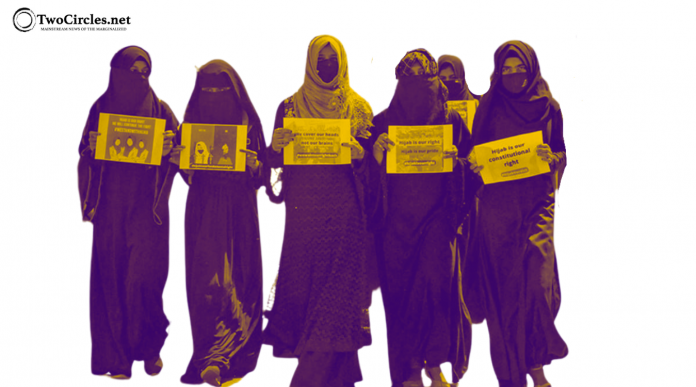
The report by PUCL Karnataka elaborates the ways in which Muslim women students were denied their right to education by being forced to stay out of the classrooms.
TCN Correspondent
MUMBAI (MAHARASHTRA) — Muslim women have dropped out of colleges and the classrooms have gotten polarized on the basis of religion, revealed a report released by human rights organization Peoples Union of Civil Liberties (PUCL) on January 9, Monday, marking one year of Hijab ban in Karnataka.
The PUCL’s Karnataka chapter undertook a study to investigate the impact of the imposed ban on the students and examine the role of authorities, administrative officials and police officials.
The report explains that through conversations with students as well as authorities, and an analysis of events that transpired, it becomes visibly clear that Muslim women students were not only actively prevented from accessing their right to education, but also bore the brunt of a climate of hate, hostility and misinformation.
“Students have faced humiliation and harassment in their own classrooms at the hands of their faculty, college administration and classmates.”
Speaking to TwoCircles.net, Arvind Narrain, President of PUCL-Karnataka, said that as per a reply in the legislative assembly on September 22, 2022 to a question posed by MLA Sowmya Reddy, in the 1 and 2 PU Colleges the total drop outs of hijab wearing girls is 1010 because of hijab ban or other reasons.
The PUCL report elaborates the ways in which Muslim women students were denied their right to education by being forced to stay out of the classrooms. Students have also recounted their experiences of loss, broken dreams and career aspirations, discrimination, segregation from other non-hijab wearing students and their feeling of fear and insecurity within the campuses of their colleges.
“The figures (of the government) indicate that the government has comprehensively failed to fulfil its constitutional mandate under Article 41 to ensure that the state has made ‘effective provision for securing the right to education’. This comprehensive failure is the result of a manifestly arbitrary government hijab policy which has instead of providing for the right to education, denied the right to education to a section of Muslim girl students. This is unconscionable.”
The report documents how vigilante groups of Hindutva organisations carried out a vilification campaign against hijab wearing students and how the inaction of the government and police gave implicit encouragement to these fundamentalist forces.
Besides focusing on other major issues, the report reveals that educational bureaucracy, including college principals and authorities, district administration and the CDCs neither received written orders from higher authorities nor gave instructions to college administrators in writing.
Their actions to ‘counsel’ Muslim students and parents and their refusal to document their grievances or take legal action against Hindutva groups who harassed Muslim students, revealed their prejudiced and biased approach towards Muslims. “College authorities too shared that they received strict orders and hence enforced a ban with immediate effect. They also treated students with disrespect and contempt.”
Zainab Gazali, Girls Islamic Organisation, ZAC Member Karnataka told TwoCircles.net that the unresolved Hijab issue is a challenge for the girl students of Karnataka.
Many girls who belong to the low-income class are largely impacted by the ban, she said. “Thousands of girls have switched their institutions.”
Elaborating on the role of the police and how they enabled a hostile environment of hate targetted against Muslim students, the PUCL report said that by going beyond their mandate and entering college campuses, forcing students to remove the hijab, taking pictures and videos of hijab-wearing Muslim women students and displaying a callous indifference to the harassment faced by the students, the police failed to fulfill their responsibility towards those who were made to be extremely vulnerable.
“The police also filed several FIRs to criminalise dissent from the Muslim community, denying them their constitutional right to freedom of expression.”
Investigating the development of the hijab discourse regarding gender, faith and empowerment, the report shows the multifarious ways in which Muslim women are asserting themselves and charting a distinct vision of assertiveness and identity. It also draws from the global narrative regarding the hijab as well as understandings coming from the local level, and also different perspectives from other students, academics, and global activists on the same.
Documenting the organized hate campaign against Muslim women students and a systematic effort to deny Muslim students their right to education while wearing the hijab, the report details how vigilante groups from Hindutva organisations used social media and college WhatsApp groups to mobilise youth to claim that the hijab is anti-national, and a threat to all Hindus.
The report also describes how the media played an active role in spreading inflammatory statements about the hijab and the protesting Muslim women students. “The TV media’s coverage, especially Kannada TV media, constantly pushed a dominant narrative that stereotyped Muslim students and grossly violated their Constitutional rights as well as the media’s codes of ethics.”
Analysing the Karnataka High Court judgment, in Resham v the State of Karnataka, the report said the analysis shows that the judgment incorrectly focused on the question of the hijab as an Essential Religious Practice (ERP) and ignored the more immediate question surrounding the practice, which is whether students have a right to express themselves through the practice and what powers does the state have to regulate their form of expression.
Gazali said, “We demand a flexible uniform and head cover. The high court interim order disappointed the students. We had hope on supreme court. But the split verdict has further complicated the issue.”
She said this is about the future of girls’ education. “The more this case holds on, it will result in a huge lose to the girls’ education.”

